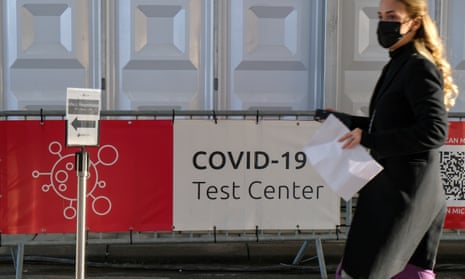A west-to-east “tidal wave” of Omicron infections risks submerging health systems across Europe, the World Health Organization has said, warning that more than half the region’s population will be infected with the variant in the next two months.
Hans Kluge, the WHO’s Europe director, said the region had recorded more than 7 million new cases in the first week of 2022, double the rate of a fortnight previously, with more than 1% of the population catching Covid-19 each week in 26 countries.
Kluge said the variant had been reported in 50 of the Europe region’s 53 states and was becoming dominant in western Europe. “At this rate, more than 50% of the population in the region will be infected with Omicron in the next six to eight weeks,” he said – a scale of transmission he described as unprecedented.
The variant would hit hardest where inoculation rates were lower, such as central and eastern Europe, Kluge predicted, saying he was “deeply concerned” that as Omicron moved east, “we have yet to see its full impact in countries where vaccination uptake is lower, and where we’ll see more severe disease in the unvaccinated”.
In Denmark, he said, where Omicron cases had “exploded in recent weeks”, the Covid-19 hospitalisation rate for unvaccinated patients during Christmas week had been six times higher than for those who were fully vaccinated.
Despite evidence that Omicron is affecting the upper respiratory tract more than the lungs, causing milder symptoms than previous variants, the WHO said it was too soon to start treating the coronavirus more as an endemic illness.
Spain’s prime minister, Pedro Sánchez, suggested on Monday that Covid-19’s evolution could be tracked as if it were a flu, without recording every case and without testing all people presenting symptoms, because its lethality had fallen.
However, Catherine Smallwood, the WHO’s senior emergency officer for Europe, said that phase was still “a way off”, adding more stable and predictable transmission would be required before Covid could be seen as endemic.
“We still have a huge amount of uncertainty and a virus that is evolving quite quickly, imposing new challenges,” she said. “We are certainly not at the point where we are able to call it endemic. It may become endemic in due course, but pinning that down to 2022 is a little bit difficult at this stage.”
Kluge said that while vaccines provided “good protection” against severe disease and death, rising hospital admissions were “challenging health systems and service delivery in many countries … and threaten to overwhelm them in many more”.
He said countries not yet hit by the Omicron surge had “a closing window of opportunity to act now” by protecting their most vulnerable citizens, as well as doing their utmost to ensure healthcare and other key workers could keep services running.
Governments in these countries should mandate high-quality masks in all closed and indoor spaces and ensure full vaccine series and booster doses were given as early as possible, especially in the health and essential services sectors, he said.
“Where the Omicron surge has begun, the priority should be to avoid and reduce harm among the vulnerable, and minimise disruption to health systems and essential services,” Kluge said. “This means prioritising vulnerable people for primary course and booster doses, advising them to avoid closed, crowded spaces, and offering the possibility to work remotely wherever possible until the infection surge passes.”
PCR testing should be prioritised for individuals at risk of severe disease and critical workers, he said and rapid tests should be deployed more widely, again “prioritising contacts at high risk of infection and at high risk of severe outcome”.
After moves by several European governments to shorten isolation and quarantine periods to prevent economies grinding to a halt, Kluge said such decisions should be taken “only when essential to preserve critical service continuity”.
Shorter isolation and quarantine times should also be conditional on negative tests, he said, adding that in general all such decisions “must be taken with careful weighing of the risks and benefits of doing so”.
Keeping schools open had “important benefits for children’s mental, social and educational wellbeing”, he said, urging governments to review protocols on testing, isolation and quarantine of classroom contacts to minimise disruption to learning.
However, he said Omicron’s greater transmissibility meant authorities should prepare for a mix of online learning and in-class attendance.
